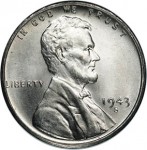According to the budget report [PDF], it says:
The production and circulation of currency in the United States have been largely unchanged for decades, despite the growth in electronic financial transactions. Treasury is undertaking a comprehensive review of U.S. currency, including a review of both the production and use of coins, in order to efficiently promote commerce in the 21st Century. These studies will analyze alternative metals, the United States Mint facilities, and consumer behavior and preferences, and will result in the development of alternative options for the penny and the nickel.
Some of this has been ongoing for the last few years. As part of the Coin Modernization, Oversight, and Continuity Act of 2010, (Public Law 111-302 [PDF]), the U.S. Mint performed and Alternatives Metals study that was completed in August 2012 and then reported to Congress in December 2012.
The problem with the study is the politics written into the law which the report addresses in the executive summary. Key to the problem is the provision written into the law that gives too much consideration to the vending and coin-operated industry. Rather than find the best metals possible while considering the factors that would have to be changed to make new coins work in devices like vending machines, parking meters, and other machines that take coins for payment, the law is written as if the vending industry has veto power over the choices.
Reading the alternative metals report is like taking a college course in metallurgy. When reading the report, it is apparent that there is no perfect solution. Either the coin sizes and weights will have to change in order to meet electromagnetic signature (EMS) requirements to make new coins similar enough to provoke fewer changes to existing equipment or the EMS of the coins will have to change and the machines reprogrammed. In either case, something will have to change.
In short, the EMS is the waveforms that are sensed when a coin is exposed to low frequency radiation (harmless to humans). The waveforms are read by sensors and compared with a programmed baseline to verify that you dropped a real coin into the machine and not a slug.
As part of the alternative metal study, the U.S. Mint is holding a stakeholders meeting. Interested members of businesses, industries, and agencies will meet with the U.S. Mint study group to share their perspectives on the impacts of alternative metal compositions on circulating coins. This meeting will be held Thursday, March 13, 2014, from 10:30 a.m. to 3:30 p.m. (EDT) at the U.S. Mint Headquarters located at 801 Ninth Street NW, Washington, D.C., 2nd floor. Attendance is by invitation only. Anyone interested in attending can contact Leslie Schwager, Office of Coin Studies at OfficeofCoinStudies@usmint.treas.gov, or by calling 202–354–6600 no later than Monday, March 10, 2014 to request an invitation and obtain additional meeting information.
You can read the full announcement about this meeting in the Federal Register 79 F.R. 6672. [PDF]
Because of the recent storms and closing of the federal government, my work requirements have shifted making it difficult for me to attend. Anyone who will attend this meeting is invited to contact me. I would be interested in hearing all perspectives about the meeting.
Given the political nature of both the budget process and the law behind the alternative metals study, it is reasonable to believe that nothing will be accomplished by the president’s budget recommendation or the meeting at the U.S. Mint. In fact, since congress has to approve any changes to U.S. coinage and that this congress has been the least productive in history, do not expect change in your pocket change any time soon.


